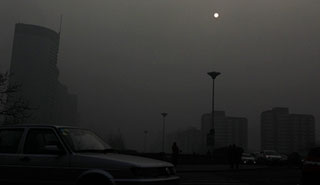It seems there’s a new way of framing climate change that could work better in getting significant action: calling it "pollution" rather than global warming or greenhouse gases.
While people can’t sense the presence of carbon, they directly experience pollution, and especially in China, they are fired up about it.
"Public concern about air pollution has helped raise awareness about broader environmental problems," Jiang Kejun, an energy advisor to the Chinese government, told the New York Times. "This will be a big help in pushing China" [on cutting climate-related emissions].
"Air pollution is the perfect catalyst," Wai-Shin Chan, director of climate change strategy in Asia for HSBC Global Research, told the NY Times. "Air pollution is clearly linked to health, and the great thing is that everybody – that’s government officials and company executives alike – breathes the same air."
Beijing this past January:

We’re seeing this shift in announcements from The World Bank and China this week.
Beijing Announces Pollution Rules
Increasingly alarmed by citizen protests and outrage over uncontained pollution, Beijing‘s municipal government made a big announcement: it will cut coal use in half from 2012 levels over the next five years, dropping it to less than 10% of the city’s energy mix.
The city has been cutting coal consumption for 14 years and now uses 7 million tons less, says China Environmental News.
The goal is to dramatically cut soot – which also happens to be a climate change forcer. The government wants to eliminate coal use in the center of the city – so far, 200,000 people have switched from coal to natural gas or electricity; the goal is for the remaining 65,000 households to do so by the end of 2015. Quotas are being set for coal use in various city districts and by key consumers.
Another goal is to stop using low quality coal by 2016. Sulfur dioxide in low quality coal contributes over 70% of coal plant emissions.
Previously, Beijing announced it would close 66 highly polluting companies this year and 1200 over the next five years to improve air quality. As of this year, no major new air-polluting facility will be approved in regions that fail to meet air pollution reduction targets.
Also starting this year, companies that break environmental laws will be unable to get bank loans or enter the public markets. On the other hand, companies in top polluting industries that buy insurance will get preference for bank loans and access to environment protection funds.
The city is also encouraging people to drive less and buy small, efficient cars, and plans to restrict cars during parts of the day from vehicles altogether. Earlier this year, Beijing set a cap of 6 million cars on the road by 2017, up from 5.35 million now. To get there, Beijing rations license plates, giving out fewer each year. Three other cities have car sales quotas and eight more could soon follow.
Cuts in car purchases could add up to 2% of 2012 sales. Automakers say they aren’t worried, they’re just moving to smaller cities.
Because it is the world’s biggest carbon emitter, China has 7 of the 10 most polluted cities, according to the Asian Development Bank.
China plans to spend $275 billion to tackle air pollution over the next five years, under The Airborne Pollution Prevention and Control Action Plan (2013-17), says China Daily.
World Bank
The World Bank says it plans to aggressively address soot and other air pollutants in developing nations – doing that cuts climate change forcers and improves human health and crop yields.
Soot, also known as black carbon, is second only to carbon dioxide in causing global warming.
Going forward, the Bank will provide funding for projects that can also cut air pollution, such as reducing methane emissions from rice fields and high efficiency cook stoves, a spokesperson told Reuters at a meeting of the Climate and Clean Air Coalition, a coalition of countries working to significantly reduce climate forcers.
Reducing climate forcers such as soot would not only dramatically scale back the advance of climate change by as much as half, it would also prevent some six million people from dying each year. And it would save about 50 million tons of crops a year that whither from air pollution.
In July, the World Bank officially announced a new policy – that it would cease financing coal plants except for rare cases. One project it’s supporting will bring water to developing nations using wind turbines.
